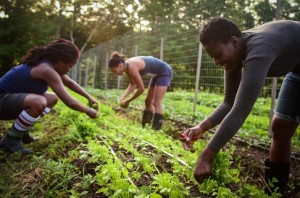- snow or sugar snap peas (3/4+ pound)
- zucchini or summer squash (1-2 fruits) – We are super excited to be getting you these crops early in the season. This is a result of experimenting and modifying our systems the last few seasons to get you more typically mid-summer crops, earlier. And we did it!
- Red Russian kale (1 bunch)
- celery (1-3) – This is a green style of celery. Use it the same as you would the store bought celery, but more flavorful and nutritious. Also great for juicing.
- turnips (1 bunch)
- scallions (1 bunch)
- cilantro (1 bunch)
- dill (1 bunch)
- Optional: dozen eggs or sprouts
ANNOUNCEMENTS
- Pasture Raised Chicken is now available for pre-order. Chickens are raised on pasture, all natural, young and tender. They are $4.25 per pound. Birds dress out at 4-6 pounds. We will have 50 birds for sale ONLY ONCE this season. They can be picked up fresh or frozen. Please sign up HERE.
- WASHING YOUR VEGGIES. We do not extensively wash veggies before delivering them to you. We will do some washing if there is a lot of dirt on greens and we always rinse root crops. In general, this allows the food to stay fresher longer. It also means you need to wash your veggies before consuming them. For greens: fill a bowl with cold water. Soak greens in water for a minute. Drain water and repeat two more times. Dirt will rinse to the bottom. Bugs should float to the top.
- Workday. Saturday August 16 – Chicken processing. 8-1. 1-3 Potluck.
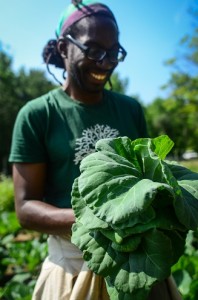
- If you are a shareholder, you have the option of volunteering 5 hours over the course of the season in exchange for an additional week of food in the fall. Be in touch to schedule your work with us, or come to a workday.
- We need more sheets. If you have old bed sheets we can use them. One of our harvest secrets is that we harvest into damp sheets instead of fancy crates. This allows the crops to stay super fresh post harvest by evaporative cooling. If you have any sheets you are looking to get rid of, we will gladly take them off your hands. You can leave them at you delivery location for us to pickup. Thank you!
- Calling all cooks and bakers! – The next Black & Latino Farmer Immersion is July 27 – August 1. One great way to support this work is through bringing a prepared dish or two, snacks, some baked goods, or bread. If you are interested we can coordinate drop-off or pickup and will talk about menu and timing.
- All of our newsletters are archived on our website, along with lots more, including educational resources and more recipes. Thanks!
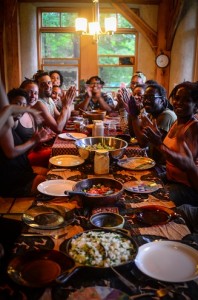 Farm News & Food Justice– the format of the newsletter is a little different this week. Leah’s piece on last week’s immersion at Soul Fire so eloquently offers how this work is central to the larger food justice struggle, while also sharing candidly about the space we hold here on the farm. Enjoy. Cry. Laugh. Be inspired.
Farm News & Food Justice– the format of the newsletter is a little different this week. Leah’s piece on last week’s immersion at Soul Fire so eloquently offers how this work is central to the larger food justice struggle, while also sharing candidly about the space we hold here on the farm. Enjoy. Cry. Laugh. Be inspired.
Photos by Capers Rumph. We will be sharing many more shortly.
Reflections on the Inaugural Black & Latino Farmer Immersion at Soul Fire Farm
by Leah Penniman
“Land is the only real wealth in this country and if we don’t own any we’ll be out of the picture.”
– Ralph Paige, Federation of Southern Cooperatives
We are an uprooted people. Our ancestors were stolen from land in West Africa, forced off of land in Mexico by NAFTA, driven off of land to take up the Trail of Tears. Some of us re-rooted. For 400+ years we tilled the red earth of the American South and we joined the ranks of “foreign-born” agricultural workers building the foundation for this country’s wealth and power. We knew the land and belonged to the land, but the land did not belong to us. Brutal racism – maiming, lynching, burning, deportation, economic violence, legal violence – ensured that our roots would not spread deeply and securely. In 1910, the height of Black land ownership, 15 million acres (14%) of farmland was owned and cultivated in our community. Now, less than 1% of farms are Black-owned. Our ancestors were forced, tricked, and scared off of land and joined the 6.5 million Black people in the greatest migration in American history, the migration to the urban North.
We were a land based agrarian people from Africa. We were uprooted from Africa and we spent 200 years developing our culture as black Americans and then we left the South. We uprooted ourselves and attempted to transplant this culture to the pavements of the industrialized North. It was a transplant that didn’t take. I think if we had stayed in the South we would have been a stronger people and because the connection between the South of the 20s, 30s, and 40s has been broken, it’s very difficult to understand who we are.”
– August Wilson, playwright
The Black and Latino Farmers Immersion at Soul Fire Farm is a humble attempt to rewrite part of this story, to reclaim our ancestral right to both belong to land and have land belong to us. The knowledge of the earth is written into our DNA. The trendy skills of sustainable living – canning, work parties, urban chickens, natural building – are not at all new. Monica White’s book “Freedom Farmers” explains how Black Southern farmers cooperatives kept alive these ancestral ways of knowing and honed them into a specific art. This past week at BLFI, we did our part to revive this knowing.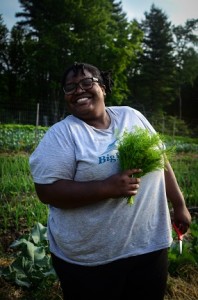
Aspiring growers joined us from local Troy and Albany and as far as California and Florida. Each person placed incredible trust in us and the process, many camping for the first time, eating whole-food version of Diasporic cuisine, working hard in hot sun and dreary rain, and engaging in deep personal reflection that allowed uncomfortable and new feelings to surface. It was, as one participant put it, “the best thing that ever happened to me.”
After an orientation where community agreements were established (e.g. do not make assumptions, show up fully…) we established a routine that married flexibility with clarity, grit with introspection. Each day, beginning at 6:30 AM we got our hands on the land. There were 3 hands-on blocks per day, ranging from 1-3 hours – a gentle introduction to the corporeal rigors of farm life. We took time to explain the how and why of each task and shared a great variety of experiences – harvesting, CSA packing, chicken care and rotation, mulching, tool weeding, hand weeding, bed preparation, tomato pruning, pest management, direct seeding, and transplanting. Anticipating the emotional fatigue of the group heading out to weed for the 3rd day in a row, I reminded us of the difference between earth’s economy and capitalism. In contrast to the linear nature of capitalism, a life bound to the earth is cyclical. We pick the weeds and they grow again and so we pick them again, on an on, for all our days. And we find beauty and presence in the picking.
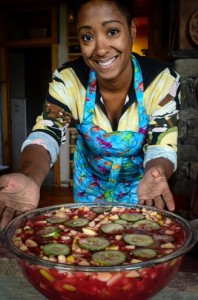 There were still learning spaces as well. During the longest work block we would break for a field class. During this time, we addressed natural building, orchard planning, tractor basics, and herb cultivation. Jonah did a beautiful job balancing times when it was correct for him, as a white person, to step forward and share knowledge (e.g. tractor class) and when to let others share their wisdom and expertise. During some of these blocks he led conversations with the other white allies, Lyssa and Capers, about their role in ending racism. We also had wonderful contributions for guest facilitators, including Naima and Adaku’s midday movement break where we shared yoga, improvisational dance, and Thai massage. I offered an afternoon class on farming theory, which included crop planning, Black land history, and soil fertility management. Finally, as the sun waned, we held space for deep personal reflection. Beatrice led us in sitting and walking meditation. Adaku brought us lovingly through a forest labyrinth wherein we were prompted to engage with our senses and our hearts. Tonya led us in a healing hum circle that dissolved into giggles and I offered a ritual herbal bath with a meditation on the beauty and completeness of our unadorned selves. The forest and pond provided our temple and kissed us with rain mist.
There were still learning spaces as well. During the longest work block we would break for a field class. During this time, we addressed natural building, orchard planning, tractor basics, and herb cultivation. Jonah did a beautiful job balancing times when it was correct for him, as a white person, to step forward and share knowledge (e.g. tractor class) and when to let others share their wisdom and expertise. During some of these blocks he led conversations with the other white allies, Lyssa and Capers, about their role in ending racism. We also had wonderful contributions for guest facilitators, including Naima and Adaku’s midday movement break where we shared yoga, improvisational dance, and Thai massage. I offered an afternoon class on farming theory, which included crop planning, Black land history, and soil fertility management. Finally, as the sun waned, we held space for deep personal reflection. Beatrice led us in sitting and walking meditation. Adaku brought us lovingly through a forest labyrinth wherein we were prompted to engage with our senses and our hearts. Tonya led us in a healing hum circle that dissolved into giggles and I offered a ritual herbal bath with a meditation on the beauty and completeness of our unadorned selves. The forest and pond provided our temple and kissed us with rain mist.
Abundant, whole-foods meals punctuated the day, prepared by rotating groups of participants with resident and guest chefs and featuring items from our respective homelands – Dominican Republic, Haiti, Brazil, Puerto Rico, Nigeria… We packed tightly around two tables and held the space with rousing, percussive gratitude songs and mildly chaotic passing of plates and food. Guest Brazilian chef Ellie Markovitz magnetized us to the kitchen with her deep reverence for food and the stories it holds. She also taught a class on whole foods preparation, during which, even the children Neshima and Emet were taking eager notes.
Throughout it all, there was a magic that cannot be captured in words. At one gratitude circle, Emet stammered, struggling to offer his thanks precisely and settled for, “I just feel so intertwined with you all.” It is true. During soils class, one participant offered a metaphor to help me explain cation exchange capacity, which compared Wu Tang Clan (high CEC) and Mos Def (low CEC) and the knowing, appreciative laughter said it all. “I see you.” The sense of family was so safe and palpable that Jonah found himself reading the speech he wrote for his brother’s wedding, which compared mulch to love. It was such that when Adaku and Lissa had to leave early, the entire group surrounding them, singing Stevie Wonder in harmony, collapsing into an “everyone hug.” It was such that, even as rain soaked bedding and cell phones, folks did not flinch – choosing love and joy over stress. It was such that the tears flowed freely at the final close and even waiting for the bus in the parking lot, we could not help but to dance.
Black and Latino Farmers Immersion was a little peek into what is possible in a mended world. Our people were once traumatized and confused, I believe. We mixed up the oppression of racism and named it the Land herself and strove to divorce ourselves from Her in an effort to get Free. But, without the land we cannot be free. Henry Kissinger said, “Control oil and control the nations; control the food and control the people.” When we get together in our dignity and power, own our means of survival, make decisions about the food system, learn to grow the food that nourishes us, cook for one another, and heal with one another – we return to wholeness.
“Grab this land! Take it, hold it…dig it, plow it, seed it, reap it, rent it, buy it, sell it, own it, build it, multiply it, and pass it on!”
– Song of Solomon by Toni Morrison

